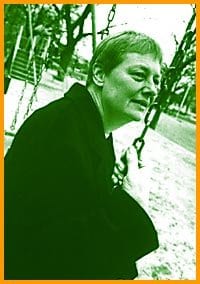After 15 years of a committed relationship, BJ abruptly found herself alone. It started slowly, her girlfriend spending more and more time with the computer until BJ wanted to smash the thing to bits. When they finally broke up and her girlfriend left the computer behind, BJ dumped it outside with the trash.
The end of a relationship can certainly provoke intense emotions. There are plenty of ways of working them out, but for gay men and lesbians the choices are often limited. Most mainstream counselling or social service organizations don’t offer queer-oriented separation or bereavement support.
New Directions is attempting to fill some of the void. Founded in 1984 as a project of the Junior League, the aim was to develop services for “displaced homemakers” – women who’d married into the myth of happy dependent homemaking and found themselves instead in the reality of separation or divorce.
“When I started as program manager in 1997,” says Silvia Samsa, currently general manager of the YWCA Women’s Shelter, “there had already been calls from lesbians needing similar services. The executive director at that time, Jannie Mills, really encouraged the board to diversify their client base, and not just around sexual orientation.”
Fourteen women came to an initial workshop in 1998. Some were from areas outlying Toronto and some from very closeted relationships – they were desperate for a place to talk about more than losing their roommate. But funding to start up a regular support group was hard to secure, and the first group for lesbian and bisexual women did not take place till early in 2000.
Nancy Mayer is the current part-time program manager whose responsibilities include development of services to lesbian and bisexual women. Despite the initial interest, it’s been a hard sell. Only six women participated in the first group, and the second (held a year and a half later) ended halfway into its six-week course when committed attendance became too low to continue.
“I would really like New Directions to be seen as a safe, nurturing place for women to talk about the end of their same-sex relationships, even just to chat over the phone,” Mayer says warmly. “There’s a lot of attention given to the impact of divorce, but there’s little legitimacy given to same-sex relationships in the first place, let alone what happens when they end.”
Mayer has been on the job for less than a year, having moved from the US to close the gap on a seven-year, long-distance relationship with a woman here. Experienced in the realm of emotional break-up, she’s keen to develop a broad range of resources and services for lesbian and bisexual women.
But in counselling circles, lesbians are notoriously unwilling to participate in groups.
“There’s the possibly erroneous assumption that lesbians want or will use the same services as straight women,” remarks Mira, a down-to-earth social worker. “The process of a mainstream agency diversifying itself is very ambitious, whether it’s around race, class or sexual orientation. Those who began New Directions likely shared a background as white, straight and middle-class. It’s not so simple just to open the door to lesbians.”
Once the door is open, there are still a number of diversities to consider within the general community of those “who consider themselves a woman in relationship with another woman,” as Mayer describes those whom she would like to see making use of the services.
“Not all lesbians share the same values,” continues Mira. “Someone who is uncomfortable with SM might not feel supportive of someone else in the group who plays, or someone who is monogamous may resent the non-monogamous practices of another group member. Those things can be hard to negotiate especially if the group is not very large.”
But others, like BJ who participated in the first support group, feel it’s most important to get the services going.
“I actually went to heterosexual groups for separation and divorce,” she says. “But I wanted a place where I could talk openly about my sexuality, and I wanted to find the resources I needed within the gay community.”
“There are never enough resources for lesbians,” agrees Liv, who came close to participating in New Directions’ second group. “I think a group like that would help break the isolation at the end of a relationship, where you want to get back into the community but you don’t want to just go out and pretend nothing’s bugging you.” She was impressed with New Directions’ approach to dealing with the issues related to a break-up, but she found the location inconvenient.
Housed in a tidy little office near Davisville and Mount Pleasant, the New Directions space is warm and welcoming but not exactly in the heart of queer Toronto. Neither is it wheelchair accessible or sitting directly on any Toronto transit route.
“We realize the location poses some problems,” admits Mayer. “But I’m not convinced that holding groups at the 519 Church Street Community Centre would make them any more welcoming for some lesbians. The first group was held off-site and we’re definitely open to using other spaces.”
At present, there is no group scheduled for lesbian and bisexual women, but the waiting list is always open.
“It’s a relief to sit with people who share what you’re going through,” says BJ, “and who give you support by listening and sometimes with lots of laughter.”
* New Directions can be contacted at (416) 487-5317, 542 Mt Pleasant Rd, Suite 203, Toronto M4S 2M7.

 Why you can trust Xtra
Why you can trust Xtra


